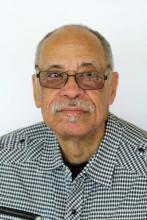Spend five minutes with Robert Haynie and you learn that he is a person who has committed himself to going where he is needed and where the need is—and most times, those two places are one in the same. Whether it’s his involvement with the National Youth Sports Program at Case Western Reserve, teaching and mentoring youth at the Cuyahoga County Juvenile Detention Center, or volunteering his time with other community organizations, Haynie is passionate about improving the lives of the marginalized and underserved people in Cleveland. Read more about Haynie.
What brought you to Case Western Reserve University?
I went to the University of Cincinnati for my undergraduate degree in chemistry, but when I decided that I wanted to get a graduate degree in 1966, they suggested that I go away for graduate school. Their thinking was that students should leave and then bring what they learned back. My advisor suggested that I apply to Caltech or MIT, but I thought that was too far away. Then he said, ‘There’s a really good school called Western Reserve.’ I thought he was talking about some kind of military academy!
So you earned your PhD in chemistry and then you attended the School of Medicine?
I had been teaching chemistry at Chicago State University and I came back to Cleveland for a meeting. I ran into a classmate who had studied physics and who decided to go to medical school. He told me that I should do the same. And I told him that I wasn’t interested. But he asked me to just meet with the associate dean at the School of Medicine, so I did. When I met with the dean, he told me that they needed more doctors who had a background like me. ‘Bob, we have a spot for you if you want to take it,’ he said. And the rest is history. It was the best decision I ever made.
At NYSP, you’ve coordinated the free medical screenings for the children. Tell us about that.
It’s all fourth-year medical students who do the screenings. And many times, we’d find underlying issues and health problems some of the children had. We’d sit down and talk to the parents and tell them that they needed to follow up with a doctor. Even though I retired 8 years ago, I still do this because I want the children to see people like me and people like the medical students. They see women, they see African Americans, they see all kinds of different people. So in some ways, this goes beyond what the program is doing.
You’ve been working with Coach Harris at NYSP for more than 20 years. Tell us about how your work with NYSP has led to your work with other programs that benefit Cleveland youth.
I always wished that there was some kind of program where we could run NYSP the entire year. So I started a program called the HOPE4 program at the Juvenile Justice Center. HOPE stands for Health Opportunity Peace and the four powers of Education, Exposure, Expectations and Equality. And in my work there, I don’t like the term “detention center” or “justice center.” I prefer the term “rescue center” because that one word can change a whole mindset—a rescued child and rescue other children out there.
I had one young person who I mentored who’s a neurosurgeon now and he had a juvenile record. When he asked me how he could become a doctor, I told him that he needed a mantra. So, we talked a little about mantras and he came up with his own. It blew me away. He said, ‘I am what I am but I’m not what I want to be.’ I knew that a light had gone off for that kid. He was accepting who he was and taking responsibility for himself and acknowledging that he was not yet what he wanted to be.
You’ve also been an advocate for lead removal.
Do you know that 80% of the homes in Cleveland built before 1978 have lead? That means that a majority of kids in Cleveland have had lead exposure. And that exposure impacts their development, their behavioral responses, their impulse control—that’s epigenetics. These young minds have been changed over a period of time. And when you add that on top of the fact that for so many, their basic needs aren’t being met, it’s no surprise that some of these kids do bad things. We have to get to these kids earlier. We have to get down to the root causes.
Explain what you mean when you say that you’re from Cleveland.
Whenever people ask someone from Cleveland where they’re from, we never say the suburb where we live. We say ‘I’m from Cleveland.’ So I ask what’s your responsibility to the city when you say that? Whether you live in Gates Mills or Bay Village or Shaker Heights or University Heights like I have for 40 years, we should all be committed to the city of Cleveland—every last one of us. If you say you’re from Cleveland, then you’re responsible for what happens in Cleveland, too.


